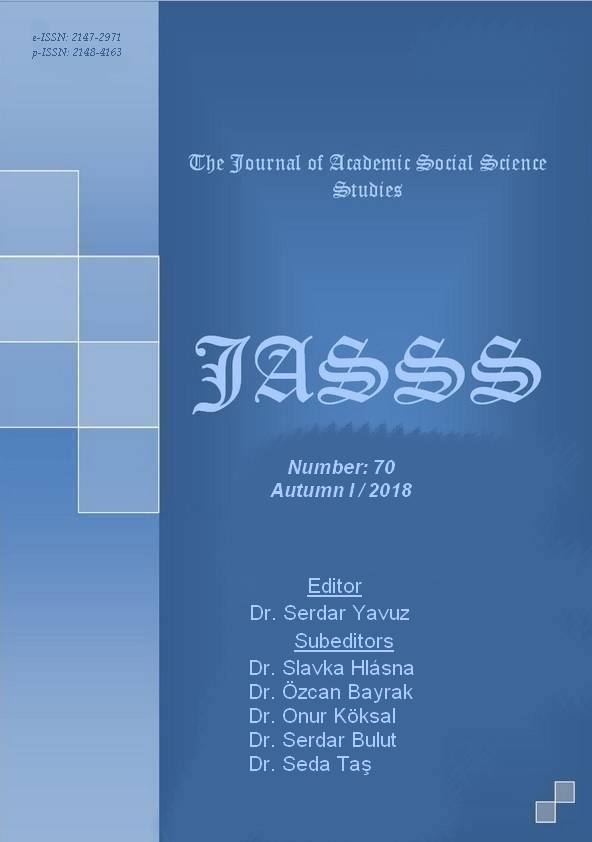Author :
Abstract
Bu makalenin amacı, Zadie Smith’in Kamboçya Büyükelçiliği adlı romanını postkolonyal bir açıdan yorumlamaktır. Postkolonyal teori, ötekilik, çokkültürlülük, ulus, kültürel yabancılaşma, melezlik, bireysel, kültürel ve etnik kimliğin inşasını anlama açısından uygun bir teoridir. Smith’in romanlarındaki kimlik politikaları genellikle kültürel ve ırksal çerçevelere dayanan perspektifler aracılığıyla yorumlanmaktadır. Kısa olup yirmi bir kısma ayrılan bu romanında Zadie Smith, Fildişi Sahili'nden Fatou adında bir kadının, İngiltere'de yaşamını sürdürmek için, Kuzey Batı Londra'da, Willesden'da bir Asya ailesi için hizmetçi olarak çalışmasını konu edinir. Fatou, birbirindeb tamamen farklı olan Asya Kültürü ve beyaz İngiliz kültürünün bir arada bulunduğu bir yerde yaşar. Kendisi de dahil bu grup üyeleri aralarında nerdeyse hiç bir iletişim olmayan, birbirine paralel fakat dağınık hayatlar yaşar. Maaş alamadan yatılı hizmetçilik yapan Fatou’nun çektiği sıkıntılar, ona, kendisini çok daha kötü durumda olanlarla özdeşleştirme cesareti verir. Nihayetinde bir köle olmadığını düşünerek kendini rahatlatır. Romanda yer alan tartışma konularından en önemlisi, şüphesiz İngiltere'nin çok kültürlü yapısıdır. Bir yandan göçmenler geleneksel ve kültürel değerlerini korumak isterken, diğer yandan ev sahibi ülkeler seküler değerlerini tehlikede görür. Fatou, hizmetçi olduğu aile tarafından benimsenmemiştir. Göçmen olarak, yeni kültürü öğrenme ve hak edinme sürecini tamamlamayamamış, ne yeni bir pozisyona edinmeyi başarmış ne de İngiltere'ye karşı duygu, aidiyet ve özdeşleşme eğilimi gösterebilmiştir.
Keywords
Abstract
The aim of this paper is to provide a postcolonial analysis of Zadie Smith’s novel The Embassy of Cambodia which merits interpretation through many perspectives. Postcolonial theory seems to be a well-used theoretical perspective that is apposite to understanding of the way in which otherness, multiculturalism, nationhood; cultural alienation, hybridity, individual, cultural and ethnic identity is constructed. Identity politics in her novels are generally construed through the frames based on cultural and racial perspective. The Embassy of Cambodia is not a short story but a novel shorter than anticipated, disengaged into twenty little parts, every one of which is a brief scene that encapsulates topics aforementioned. In The Embassy of Cambodia, Zadie Smith portrays the story of a woman called Fatou from Ivory Coast looking for fortune in England as a housemaid for an Asian family in Willesden in North West London. Fatou lives in a place where there are two isolate societies: the Asian culture and the white British culture. Individuals from both of these groups including Fatou live parallel yet partitioned lives with scarcely any association between the two. There is an abount migrant Muslim populace in the city town, yet neither the natives nor the migrants know each other. She is an unpaid house keeper and her sufferings empower her to identify herself with individuals who are in conditions far more awful. Consequently, she was comforted herself by thinking that she was not a slave. Of the debates taking place in the novel, the multicultural nature of England is by all means the most critical one. On the one hand, immigrants want to preserve their traditional and cultural values, whereas on the other hand, host countries see their secular values in jeopardy. Fatou has not been accepted by the family in which she is servant. As a migrant she has not completed the process of learning the new culture, acquisition of rights, nor has she achieved the accession to a new position and also has she no inclination of feeling and belonging and identification towards England.





